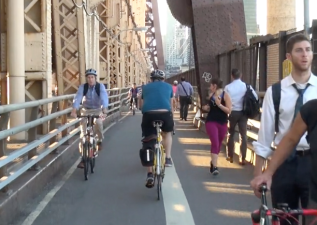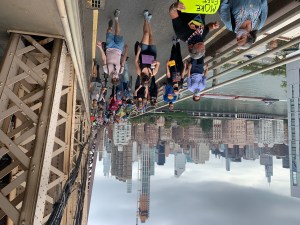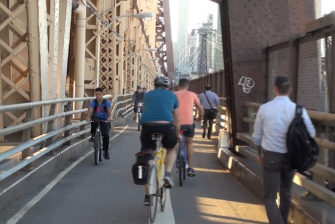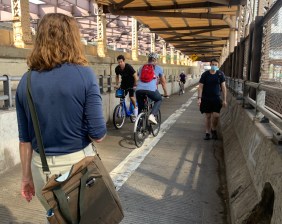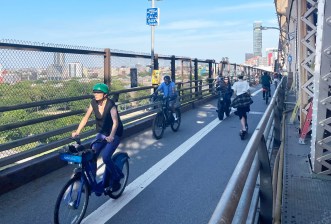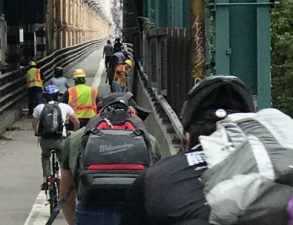OPINION: Build the Queensboro Bridge Pedestrian Path Now!
The DOT should not allow dangerous conditions for walkers and bikers to fester until the end of 2022. But it will — so as not to inconvenience motorists.
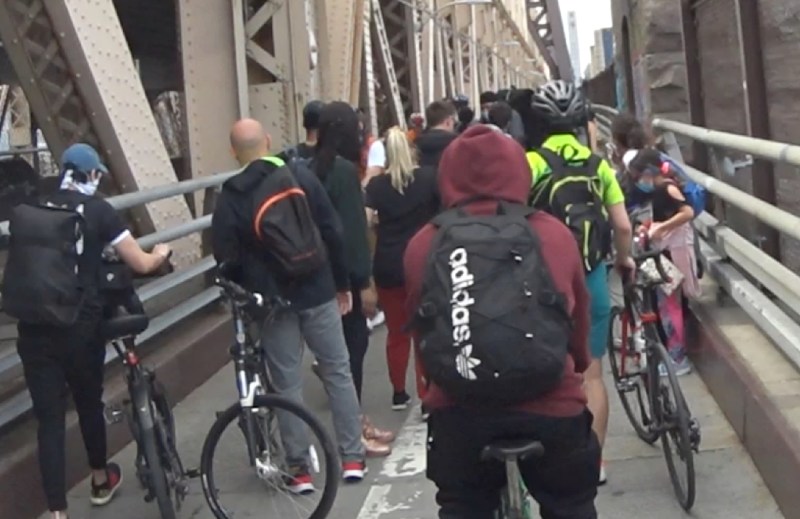
The city’s conversion of a car lane on the Ed Koch Queensboro Bridge to a dedicated pedestrian path — which is slated to be finished in late 2022 if everything goes perfectly — should happen even sooner before more crashes injure or even kill pedestrians or cyclists who now share a single, bi-directional lane on the dangerous span.
But it won’t, because the Department of Transportation, as usual, is putting the convenience of motorists over the safety of bicyclists and pedestrians.
Street-safety advocates celebrated in January when the DOT agreed to convert the South Outer Roadway, an underused car lane, to pedestrian use, and leave its northern counterpart available only to cyclists. The move came after years of frequent crashes and injuries to pedestrians, cyclists, e-bike riders and moped users on the shared 11-foot-wide North Outer Roadway, years of campaigning for dedicated lanes for bikers and walkers, supported by elected officials, businesses, and bridge users in Queens and Manhattan — and years of city foot-dragging.
How many ways did the city stall?
First, the DOT said it couldn’t make dedicated lanes for cyclists and walkers, but could “study” the issue only at the end of 2022, after the completion of the reconstruction of the bridge’s upper deck. Until then, the department said, it needed the SOR for motorists. After that excuse fell apart (the people walking and biking on the NOR outnumber the cars on the SOR), the DOT said that it couldn’t convert the SOR for pedestrian use because its walls were so low that walkers could fall or jump off the bridge, and that such protective fencing was too expensive. Happily, City Council members and the Queens borough president last year allotted discretionary funding to pay for the fence.
Now the Landmarks Preservation Commission has approved the work of the engineering firm that the DOT engaged to design the SOR protective fence. [See document embedded below.] It could start soon. So what’s the hold up? (One initial theory? The DOT has been aware of the need for a fence for years, yet only presented its idea to the Commission on May 6 of this year. What’s that all about?)
The DOT evidently still prefers to let motorists use the SOR during the upper-roadway reconstruction; its presentation for the bridge replacement says that the “South Outer Roadway & Lower Roadway [are to remain] open at all times” during all construction stages. Non-car bridge users can take a back seat.
“All of the engineering work is complete and the SOR fence could go up immediately if DOT Bridges expedited and prioritized it,” said Laura Shepard, a moving force behind the QBB campaign. “Its decision to preserve Level of Service for vehicles for the duration of the upper deck rehabilitation is causing congestion and leading to more crashes and injuries among cyclists.”
The SOR conversion appears to have been foisted upon the DOT Bridges Division, which in the past has not been especially attentive to cyclists’ and pedestrians’ concerns (if they weren’t outright hostile). For this division of car-centric road engineers, the replacement of the upper deck highway is the main gig, and the erection of pesky pedestrian infrastructure is a sideshow, if not a distraction. Why should they have to fiddle with their timelines — and risk the ire of car commuters?

Yet for cyclists and pedestrians, another year and a half of crashes and near misses on the bridge is untenable and intolerable. Conditions have worsened as the number of riders of faster e-bikes and mopeds (legal or not) on the shared path has risen dramatically, along with the number of conventional cyclists.
“One problem with the timeline is that the DOT’s inaction has already basically destroyed bicycling,” said Steven Bozdin, a Queens cycling advocate. “The agency insisted on leaving us with this tiny path, and allowed any vehicle that can fit to use it. Just as bikes made life miserable for pedestrians for years, now e-bikes and small motorcycles make life miserable for cyclists. It’s truly hard, unpleasant, and dangerous to share the space with more-powerful vehicles equipped with loud electric horns and driven by people who have no experience on city streets — particularly no experience with bikes.”
One of the features of NYC’s COVID #bikeboom has been a surge in ? crossings of the Queensboro Bridge. QB #bikenyc volume rose above that on the Manhattan Bridge for the first time last year, and that has held for the 1st half of 2021 pic.twitter.com/T2nSKEbKD8
— Bike New York (@bikenewyork) July 30, 2021
So what could make the conversion happen faster? The DOT could issue an emergency contract for temporary fencing, as some, such as Bike New York’s Jon Orcutt, have argued. Meanwhile, the Brooklyn Bridge bike-lane project, which seems far more complex, is already mostly done.
The DOT has many dedicated, knowledgeable employees doing bike and pedestrian planning , some of whom come from the bike- and pedestrian-advocacy community. Queens activists have walked and biked over the bridge with DOT planners and managers; they’ve experienced the hazards, and they “get it.” But they are also up against a bureaucratic wall, not to mention a lame-duck commissioner with no transportation background and an administration who both still fail to realize that this conversion needs to happen ASAP, before someone is killed or seriously injured.
I’m not optimistic, though: Besides a lame-duck mayor and DOT commissioner, the Manhattan borough president and City Council members on both sides of the bridge are also term limited, so there is no one to pressure the DOT. We, as advocates, need to get the attention of the new administration and electeds on January 1 to erect a solution, even a temporary one, right away.
Steve Scofield is a cycling activist in Queens.
The Landmarks Preservation Commission Report on the Queensboro Bridge Bike Path by Gersh Kuntzman on Scribd
